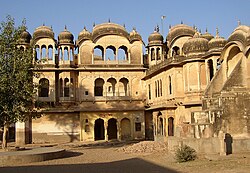Jhunjhunu district | |
|---|---|
 Location of Jhunjhunu district in Rajasthan | |
| Coordinates(Jhunjhunu): 75°01′N76°04′E / 75.02°N 76.06°E - 27°23′N28°19′E / 27.38°N 28.31°E | |
| Country | |
| State | |
| Division | Jaipur |
| Headquarters | Jhunjhunu |
| Tehsils | |
| Government | |
| • District Collector & Magistrate | Dr. Arun Garg, IAS [1] |
| • Superintendent of Police | Lokesh Sonewal , IPS [1] |
| • Member of Parliament | Brijendra Singh Ola , INC |
| Area | |
• Total | 5,928 km2 (2,289 sq mi) |
| Population (2011) | |
• Total | 2,137,045 |
| • Density | 360.5/km2 (933.7/sq mi) |
| • Urban | 22.89 percent |
| Demographics | |
| • Literacy | 74.72 |
| • Sex ratio | 950 |
| Time zone | UTC+05:30 (IST) |
| Major Highways | National Highway 11 State Highway 8 |
| Website | Jhunjhunu District |
Jhunjhunu district is a district of the Indian state of Rajasthan in northern India. The city of Jhunjhunu is the district headquarters. The district is famous for the frescos on its grand havelis and for providing considerable representation to Indian defense forces. The district falls within the Shekhawati region, and is bounded on the northeast and east by Haryana state, on the southeast, south & southwest by Sikar district & on the northwest and north by Churu district. [2]





